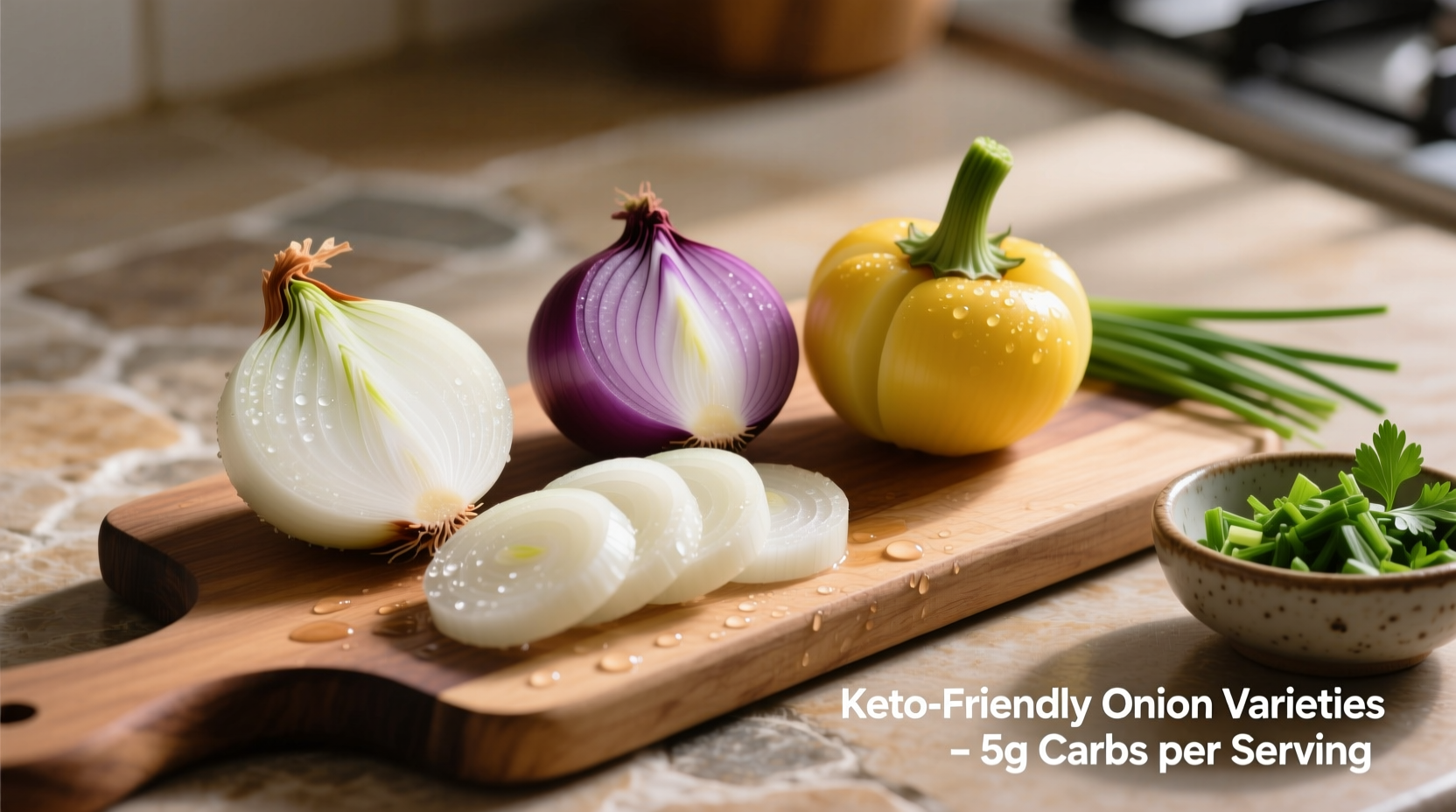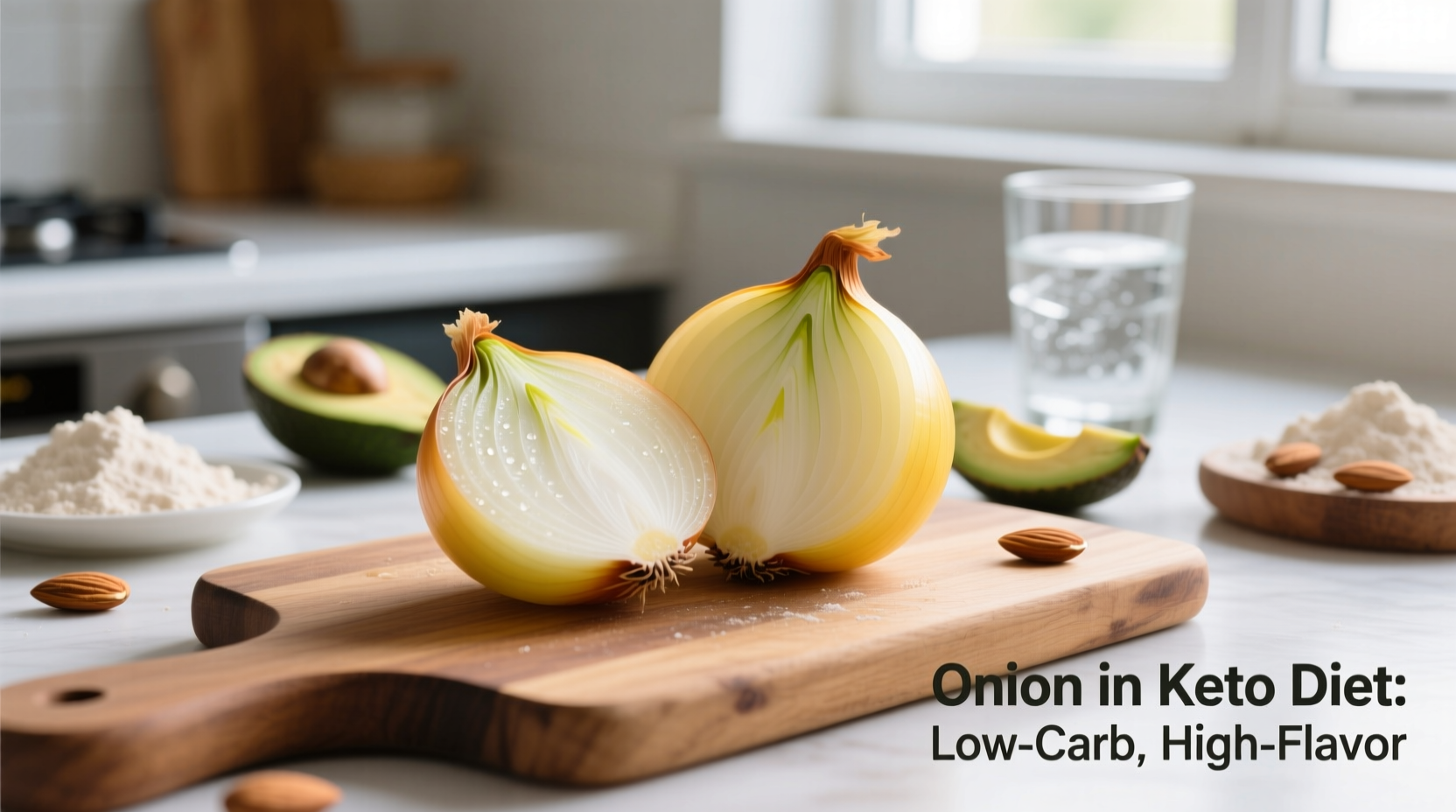Many keto dieters unnecessarily eliminate onions from their diet due to carb concerns. As a culinary expert who's worked with professional kitchens and home cooks for over 15 years, I've seen how strategic onion usage can enhance keto meals without breaking ketosis. The key lies in understanding the carb differences between onion varieties and implementing smart portion control techniques that maintain flavor while staying within your daily carb limit.
Why Onions Confuse Keto Dieters
Onions present a unique challenge for keto followers because they're neither clearly keto-friendly nor completely off-limits. Unlike high-carb vegetables like potatoes or corn that must be avoided, onions occupy a middle ground where careful portioning allows for inclusion. This confusion stems from the significant variation in carb content across different onion types—a critical factor many keto beginners overlook.
Carb Comparison: Onion Varieties for Keto
| Onion Type | Net Carbs per 100g | Keto-Friendly Serving Size | Typical Use in Keto Cooking |
|---|---|---|---|
| Green Onions (Scallions) | 1.8g | Unlimited | Garnish, salads, stir-fries |
| White Onions | 5.8g | 30-50g per meal | Salsas, grilled dishes |
| Yellow Onions | 7.0g | 15-30g per meal | Caramelizing, soups, stews |
| Red Onions | 6.2g | 20-40g per meal | Salads, pickling, garnishes |
| Shallots | 10.5g | 5-10g per meal | Sauces, dressings, finishing |
This nutritional breakdown, verified through the USDA FoodData Central database, reveals why green onions should be your primary onion choice on keto. Their significantly lower carb content allows for generous use without impacting ketosis. For reference, a single medium yellow onion contains approximately 9g net carbs—nearly half of a strict keto dieter's daily carb allowance.
Strategic Onion Incorporation Techniques
Professional chefs have mastered techniques to maximize onion flavor while minimizing carb impact—techniques easily adaptable for home keto cooking:
- The 80/20 Rule: Use 80% green onions with 20% yellow or red onions for depth of flavor with minimal carb impact
- Infusion Method: Simmer onion pieces in oil or broth for 20 minutes, then remove before serving—transferring flavor without the carbs
- Concentrated Flavor Boost: Roast a whole onion until caramelized, then use just 1-2 teaspoons of the concentrated juices per serving
- Layering Technique: Add onions at multiple cooking stages—raw in salads, lightly sautéed in mains, and roasted for finishing—to create complex flavor with less quantity

Keto-Friendly Onion Alternatives
When you need to eliminate onions completely or want variety, these alternatives provide similar flavor profiles with minimal carbs:
- Asafoetida (Hing): This pungent spice (use 1/8 teaspoon) mimics onion flavor with virtually zero carbs—perfect for Indian-inspired keto dishes
- Fennel Bulb: With just 2.9g net carbs per 100g, thinly sliced raw fennel provides a similar crunch and mild onion-like flavor
- Radish Greens: Often discarded, these have a mild onion flavor with only 1.9g net carbs per 100g—excellent in salads
- Chives: At 2.2g net carbs per 100g, they deliver onion flavor with less intensity but greater volume
Common Onion Mistakes on Keto (And How to Avoid Them)
Based on my experience teaching home cooks, these are the most frequent errors I see with onions in keto cooking:
- Underestimating Portion Sizes: A "small handful" of diced yellow onions often exceeds 50g—more than double the recommended serving. Always measure until you develop visual estimation skills.
- Ignoring Cooking Effects: Caramelizing onions concentrates their natural sugars, increasing carb density. Add a splash of vinegar during cooking to counteract this effect.
- Overlooking Hidden Onions: Pre-made broths, sauces, and spice blends often contain onion powder. Check labels—just 1 teaspoon of onion powder contains 3g net carbs.
- Wasting Onion Parts: Onion skins contain quercetin (an antioxidant) with negligible carbs. Simmer skins in your broth for added flavor without carb impact.
Practical Meal Integration Strategies
Successful keto dieters don't just restrict foods—they strategically plan their carb allocations. Here's how to incorporate onions without compromising your goals:
- Weekly Carb Budgeting: Allocate 5-10g of your weekly carb allowance for onions, spreading usage across multiple meals rather than concentrating in one dish
- Flavor Maximization: Combine small amounts of yellow onion with larger quantities of green onions and chives to create layered flavor with reduced carb impact
- Strategic Timing: Use onions in your first meal of the day when you have the entire day to metabolize the carbs, rather than in your final evening meal
- Pre-Portioning: Dice and freeze onions in 15g portions (approximately 1g net carbs) for easy addition to meals without overindulging
When to Limit or Avoid Onions Completely
While onions can fit into most keto diets, certain situations warrant extra caution or complete avoidance:
- Therapeutic Ketosis: Those following keto for medical reasons (epilepsy management, certain cancer protocols) often need to stay below 20g net carbs daily—requiring strict onion limitation
- Carb Cycling Days: On your lowest-carb days, eliminate onions to maximize fat-burning potential
- Gut Health Concerns: Onions contain FODMAPs that can trigger digestive issues in sensitive individuals—consider elimination if experiencing discomfort
- Plateau Periods: When weight loss stalls, temporarily eliminating onions can help identify if hidden carbs are affecting progress











 浙公网安备
33010002000092号
浙公网安备
33010002000092号 浙B2-20120091-4
浙B2-20120091-4